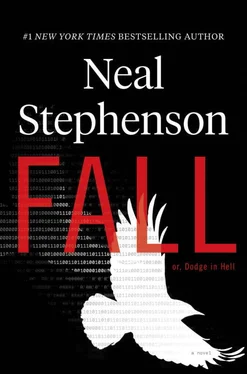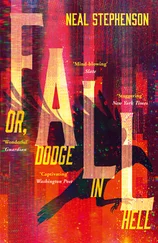Moments later, he had awoken with a start, and sat up convulsively. His body worked again. He threw off the heavy duvet and swung his feet off the bed, turning to face the dying fire a few feet away. No one else was in the chamber. The massive fortress-style door was still bolted. The nightmare impression, which had been so convincing a minute ago, now seemed ridiculous. Lying back down experimentally, he looked up and saw that the lamp on his bedside table was casting a firelight shadow onto the canopy above him, and that the shadow moved about as the fire flickered and the logs settled. He must have half-opened his eyes while sleeping and interpreted this as the shadow of a man.
So the nightmare had an explanation. Still mysterious, though, was the absolute paralysis that had trapped him in that bad dream. Later, Richard had learned that this was a well-recognized and scientifically verified phenomenon known as sleep paralysis. Primitive cultures identified it as some form of enchantment, or made up stories about eldritch night-stalking creatures that would sit on your chest and pin you to your bed and suck the air from your lungs and the screams from your throat.
But there was a perfectly reasonable explanation for it. When you were awake, your brain could of course control your body. When you slept, however, you tended to dream. And in your dreams you could run, fight, and talk. But if the body continued to answer commands from the brain, you’d be thrashing all over the bed, vocalizing, and so on. So a mechanism had evolved whereby, at the moment that the thread of consciousness was severed, the link between brain and body was cut, like throwing a switch. And at the moment you woke up, the switch was thrown back to the “on” position and you went back to moving around as you always did. Normally the system worked with an amazing degree of perfection, so most people lived their whole lives not even knowing that it existed. But every system had glitches. The jolt you sometimes made while drifting off to sleep was one such—it happened when the switch was a fraction of a second late going off. Another, much more impressive and terrifying sort of glitch happened every so often, especially to people who—as in Richard’s case on the Isle of Man—were sleeping off of their accustomed schedule. You would wake up, but the switch would not be thrown to “on” and so you would remain as perfectly paralyzed as you had been a moment ago while sound asleep. Just like a person who, while seeming to slumber and breathe peacefully, is in fact having a terrible nightmare, you would lie there with eyes open in perfect, inescapable repose, unable to do anything about the imaginary monster on your chest, the intruder next to your bed, the fire consuming your house.
In any case, the only lasting consequences for Dodge had been more desultory browsing about how sleep worked and further introspection about his own napping practices. This was how he had developed his theory—which was unsupported by any scientific evidence whatsoever—that the one and only key to a successful nap was to break the thread of consciousness just long enough for the switch to be thrown to “off.” When it got thrown to “on” again, even if it was only a few minutes later, the brain–body system rebooted itself, like a fucked-up computer that just needs to be unplugged from the wall for ten seconds and restarted in order to come back to life in clean working order.
This notion around thread cutting was what finally brought him awake, since a connection had somehow been made in his mind, and now it was going to keep him awake. He had reached the point in his life where very few things could really compel him to get out of bed, but one of the calls to which he would readily answer was that of his own stray musings and thoughts, his mind’s desire to make connections.
It did not, however, actually get him out of bed. Ringing in the ears did that. His tinnitus was especially annoying today—the world’s way of telling him he needed to get up and make a little noise. He’d long suffered from a mild case, the result of too many guns fired and nails pounded in his youth, too many nights in British Columbia biker bars. Then, a few years ago, he had been exposed to a lot of close-up gunfire without appropriate hearing precautions. Without precautions of any kind whatsoever, for that matter. Ever since, he had rarely been without some amount of ringing in the ears—sometimes a high-pitched tone, sometimes a hiss. The cause of the condition was somewhat mysterious. It seemed to be some sort of well-meaning attempt by the brain to make sense of a loss of valid signals from ears that were no longer in perfect working order. Tending to confirm this idea was that it was at its worst when things were quiet; the environment wasn’t giving his auditory system any good data to lock on to. The solution was to get up and make noise. Not necessarily a lot. Just the normal sounds of footsteps and faucet running that reassured his brain that there was a coherent world out there and gave it a few simple clues as to what was actually what.
He got up, pulled on pajama bottoms, urinated, took the pills he was supposed to take before breakfast, and went out to the so-called great room of his penthouse, which was on the top of a thirty-two-story building in downtown Seattle. It was a very expensive piece of real estate that, in the manner typical of Northwest tech industrialists, was built out and decorated in a manner so simple, bare-bones, and informal as to be actually kind of ostentatious. Glass doors made up much of its western exterior wall, and he had left these open all night, doubling the size of the living area by joining it to the terrace. The terrace had a glass roof with infrared heaters like the ones suspended above the cash registers at Home Depot to keep the Somalian and Filipino checkout clerks from succumbing to hypothermia. These made it comfortable even when it was fifty degrees Fahrenheit and raining, which was about half of the year. In late summer and (as now) early autumn, the heaters weren’t needed, and so the terrace just served as an extension of the great room, which flowed into it without interruption. It faced toward Elliott Bay and the Olympic Mountains beyond.
Anomalous splashes of pink and purple flared against the wood, leather, and stone. Richard had a grandniece, Sophia, who for all intents and purposes was his granddaughter, and she came over frequently. Last weekend, her parents—Richard’s niece Zula and her husband, Csongor—had left her with him for two nights so that they could enjoy a little getaway in Port Townsend, on the other side of Puget Sound. Richard’s terrace had a direct view down onto the ferry terminal. He had a huge pair of Soviet military surplus binoculars mounted on a tripod at the railing. As their ferry had churned away from the terminal, Richard had perched Sophia on a stool and helped her get the lenses aimed down at the ferry, where Zula and Csongor, after parking their car belowdecks, had ascended to the topmost deck and stationed themselves at the stern to wave up at her. The whole affair had been coordinated via text message and had come off with the precision of a drone strike, all to the delight of little Sophia. Richard had been unaccountably depressed by it, or perhaps “ruminatively melancholy” was a better way of putting it.
Forty-eight hours of intensive grandniece/great-uncle bonding had ensued. In that short time Sophia’s apparatus of modern kiddom had permeated Richard’s apartment. Even if she never again set foot in this place, he would be finding Cheerios, glitter, sticky handprints, and barrettes for the next twenty years.
Sunday evening they had done the thing with the binoculars again as the parents had steamed back into port. Zula had explained what a good thing it was psychologically for a kid Sophia’s age to see the parents go away, but then to see them come back again. During the stress of executing their withdrawal, they had left behind a Whole Foods grocery sack containing several of Sophia’s books. Richard had placed it by the door so that it would be more difficult to overlook next time. But while his coffee machine was processing he retrieved it. He took it and his coffee to the low table on the terrace and pulled out two large-format picture books, which he had bought for Sophia on Saturday. Both of them featured the same style of colorful faux-naive artwork, for they were both by the same coauthors, Ingri and Edgar Parin d’Aulaire. One was entitled D’Aulaires’ Book of Greek Myths and the other D’Aulaires’ Book of Norse Myths . Richard had picked them up on impulse while he and Sophia had been hanging out in a bookstore. The cover art on Greek, perceived dimly in his peripheral vision, had jumped down his optic nerve to his brain and caused his body to freeze up almost as when he’d experienced sleep paralysis on the Isle of Man. Or, considering the context, as if he had beheld a Gorgon (and come to think of it, might it not be the case that ancient myths concerning Gorgons and basilisks were pre-scientific explanations of the phenomenon of sleep paralysis?).
Читать дальше
Конец ознакомительного отрывка
Купить книгу

![Нил Стивенсон - Криптономикон [litres]](/books/23868/nil-stivenson-kriptonomikon-litres-thumb.webp)






![Нил Стивенсон - Падение, или Додж в Аду. Книга первая [litres]](/books/392729/nil-stivenson-padenie-ili-dodzh-v-adu-kniga-perva-thumb.webp)
![Нил Стивенсон - Лавина [litres с оптимизированной обложкой]](/books/414066/nil-stivenson-lavina-litres-s-optimizirovannoj-ob-thumb.webp)

